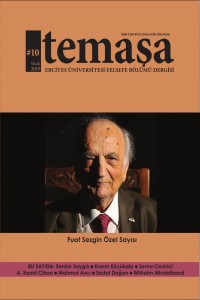Abstract
M.Ö. 65 - M.S. 4 yılları arasında yaşamış olan Lucius Annaeus Seneca, ‘Roma Stoası’ ya da ‘Yeni Stoa’ adı verilen dönemin kurucu
düşünürleri arasındadır. Seneca’nın görüşlerinin temelinde kendinden önceki pek çok filozofun ve ekolün düşüncelerinin
sentezlenmiş hali yer alır. Özellikle Sokrates’in bilgi görüşü ile Kynikler’in doğaya uygun yaşama ideali onu derinden etkilemiştir.
Yine içinde bulunduğu Stoacılığın temel düşüncelerinin savunusu da onun düşüncelerinin önemli bir bölümünü oluşturur. Seneca
felsefeyi, ruhu geliştirip aydınlatan, yaşama düzen veren, karşısına çıkan sorulara cevap verecek başlıca alan olarak görür ve
bunu elde etmeye yarayan araç ise akıldır. Bununla beraber Seneca’nın felsefesinde ahlak ve siyaset görüşleri daha ön plandadır.
Biz bu makalede onun ahlaka dair görüşleri üzerinde duracağız. Yine bu makalede onun düşüncelerinin daha çok pratik felsefenin
bireysel tarafına karşılık geldiğini ve bu yaşamın olmazsa olmazının ahlaki düşünceler olduğunu göstermeye çalışacağız.
Seneca’nın ahlak düşüncesini, bilgi, erdem ve bilgelik döngüsü içinde mutluluğu yakalamaya çalışan ve ölümü yenen bir anlayışla
oluşturduğunu da azami ölçüde değerlendirmeye çalışacağız. Seneca’nın ahlakla ilgili görüşlerine geçmeden önce görüşlerinin
şekillendiği dönemin genel özelliklerine makalenin sınırlarını gözeterek yer vermeye gayret edeceğiz.
References
- Arslan, Ahmet. Felsefeye Giriş. Ankara: Vadi Yayınları, 2002.
- Arslan, Ahmet. İlkçağ Felsefesi Tarihi. Helenistik Dönem Felsefeleri: Epikurosçular, Stoacılar, Septikler. İstanbul: İstanbul Bilgi Üniversitesi Yayınları, 2017.
- Birand, Kamıran. İlk Çağ Felsefesi Tarihi. Ankara: AÜİF Yayınları, 1958.
- Brun, Jean. Stoa Felsefesi. çev. Medar Atıcı. İstanbul: İletişim Yayınları, 2003.
- Cevizci, Ahmet. Felsefe Sözlüğü. İstanbul: Paradigma Yayınları, 2002.
- Gökberk, Macit. Felsefe Tarihi. İstanbul: Remzi Kitabevi, 1999.
- Inwood, Brad. Ethics and Human Action in Early Stoicism. Oxford [England]: Clarendon Press, 1985.
- Lana, İtalo. “ Antik Dünyada Özgürlük”, çev. Filiz Öktem, Cogito, (Kış:1995), 117-131.
- Leartios, Diogenes. Ünlü Filozofların Yaşamları ve Öğretileri. çev. Candan Şentuna, İstanbul: Yapı Kredi Yayınları, 2007.
- Özden, H. Ömer; Elmalı, Osman. İlkçağ Felsefesi Tarihi. İstanbul: Bilge Kültür Sanat Yayınları, 2017.
- Seneca. Ahlaki Mektuplar. çev. Türkan Uzel, Türk Tarih Kurumu Yayınları, Ankara, 1992.
- Seneca. Doğa Sorunları. çev. Çiğdem Dürüşken, Cogito, Sayı:20, 1999.
- Seneca. Hoşgörü üzerine. Çev. Bedia Demiriş, Doğu-Batı Yayınları, İstanbul, 2014.
- Seneca. Ruhun Dinginliği. çev. Bedia Demiriş, Yapı Kredi Yayınları, İstanbul, 1999.
- Seneca. Teselliler. Çev. Kenan Sarıalioğlu, Kırmızı Yayınları, İstanbul, 2010.
- Seneca. Yaşamın Kısalığı. çev. Elif Gökteke, Cogito, Sayı:15, 1998.
- Şenel, Alaeddin. Siyasal Düşünceler Tarihi. Ankara: Bilim ve Sanat Yayınları, 1996.
- Topakkaya,Arslan, “Stoa Etiğinin Temel Kavramları”, Felsefe Dünyası, sayı.49 (2009/1), 56-69.
- Topakkaya, Arslan, “Kant’ın `Ahlak(Iliğ)in Metafiziği Adlı Yapıtında Etiğin Temellendirilmesi”, Doğu-Batı Dergisi, 4. Sayı, 3. Baskı, (2004/1), 69-79.
Abstract
Lucius Annaeus Seneca, who lived between B.C. 65 – A.D. 4, is among the founding thinkers of the period called ‘Roman Stoa’ or
‘New Stoa’. The essence of Seneca’s ideas is the synthesized state of many philosophers and school minds before him. Especially,
Socrates’ view of knowledge and Kynik’s ideal of living in harmony with nature, deeply influenced him. The defense of the basic
ideas of Stoicism, which he is also in, includes a considerable part of his considerations. The Seneca sees philosophy as the principal
area to develop and illuminate the spirit, to order life, to answer questions that arise and the means to achieve it is mind. However,
in Seneca’s philosophy, moral and political views are more in the foreground. In this article we will investigate his views on morality.
We will also try to show that his thoughts correspond more to the individual side of the practical philosophy and that the sine
qua non of this life is moral thought. We will also try to evaluate Seneca’s moral thinking, the pursuit of happiness in the cycle of
knowledge, virtue and wisdom, and the creation of a new understanding of death. Before going to Seneca’s views on ethics, we will
try to give place the general characteristics of the period in which his views are shaped, taking into account the limits of the essay.
References
- Arslan, Ahmet. Felsefeye Giriş. Ankara: Vadi Yayınları, 2002.
- Arslan, Ahmet. İlkçağ Felsefesi Tarihi. Helenistik Dönem Felsefeleri: Epikurosçular, Stoacılar, Septikler. İstanbul: İstanbul Bilgi Üniversitesi Yayınları, 2017.
- Birand, Kamıran. İlk Çağ Felsefesi Tarihi. Ankara: AÜİF Yayınları, 1958.
- Brun, Jean. Stoa Felsefesi. çev. Medar Atıcı. İstanbul: İletişim Yayınları, 2003.
- Cevizci, Ahmet. Felsefe Sözlüğü. İstanbul: Paradigma Yayınları, 2002.
- Gökberk, Macit. Felsefe Tarihi. İstanbul: Remzi Kitabevi, 1999.
- Inwood, Brad. Ethics and Human Action in Early Stoicism. Oxford [England]: Clarendon Press, 1985.
- Lana, İtalo. “ Antik Dünyada Özgürlük”, çev. Filiz Öktem, Cogito, (Kış:1995), 117-131.
- Leartios, Diogenes. Ünlü Filozofların Yaşamları ve Öğretileri. çev. Candan Şentuna, İstanbul: Yapı Kredi Yayınları, 2007.
- Özden, H. Ömer; Elmalı, Osman. İlkçağ Felsefesi Tarihi. İstanbul: Bilge Kültür Sanat Yayınları, 2017.
- Seneca. Ahlaki Mektuplar. çev. Türkan Uzel, Türk Tarih Kurumu Yayınları, Ankara, 1992.
- Seneca. Doğa Sorunları. çev. Çiğdem Dürüşken, Cogito, Sayı:20, 1999.
- Seneca. Hoşgörü üzerine. Çev. Bedia Demiriş, Doğu-Batı Yayınları, İstanbul, 2014.
- Seneca. Ruhun Dinginliği. çev. Bedia Demiriş, Yapı Kredi Yayınları, İstanbul, 1999.
- Seneca. Teselliler. Çev. Kenan Sarıalioğlu, Kırmızı Yayınları, İstanbul, 2010.
- Seneca. Yaşamın Kısalığı. çev. Elif Gökteke, Cogito, Sayı:15, 1998.
- Şenel, Alaeddin. Siyasal Düşünceler Tarihi. Ankara: Bilim ve Sanat Yayınları, 1996.
- Topakkaya,Arslan, “Stoa Etiğinin Temel Kavramları”, Felsefe Dünyası, sayı.49 (2009/1), 56-69.
- Topakkaya, Arslan, “Kant’ın `Ahlak(Iliğ)in Metafiziği Adlı Yapıtında Etiğin Temellendirilmesi”, Doğu-Batı Dergisi, 4. Sayı, 3. Baskı, (2004/1), 69-79.
Details
| Primary Language | Turkish |
|---|---|
| Journal Section | Articles |
| Authors | |
| Publication Date | January 28, 2019 |
| Submission Date | November 5, 2017 |
| Published in Issue | Year 2019 Issue: 10 |


